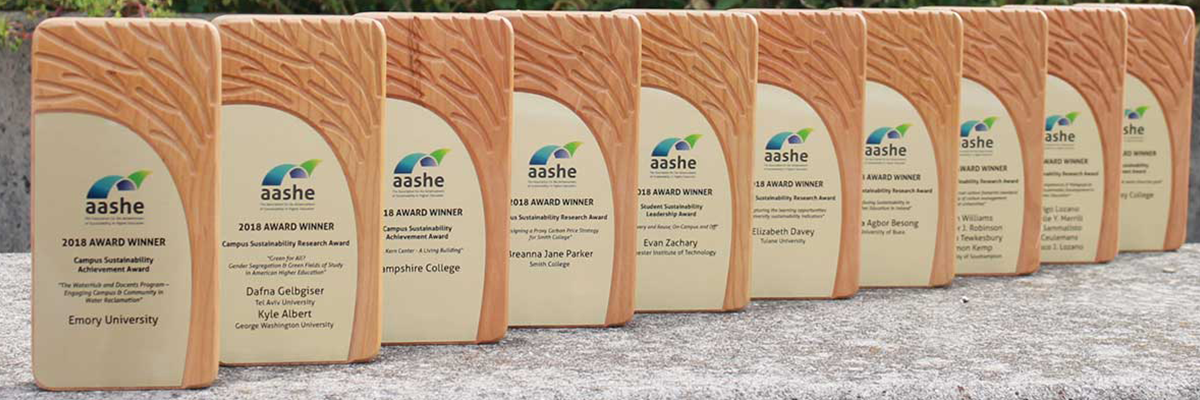
Congratulations!
Earning an AASHE Sustainability Award is a special achievement. We hope that you will help us highlight this prestigious achievement to increase recognition for you and your institution or research. All winners will be publicly announced on Sept. 9 via a press release, social media posts and on AASHE’s awards website. To magnify the promotional effect, please consider also sharing this news on Sept. 9 after 11 a.m. ET using the resources available on this page.
As a winner, you also receive:
- A complimentary pass to the 2019 AASHE Conference & Expo
- A plaque from Rivanna Natural Designs
- Option to present a conference session and a webinar presentation
- A feature in Sustainability: The Journal of Record
Again, congratulations to you and/or your institution. We look forward to publicly celebrating this honor with you onstage on Oct. 27 during the 2019 AASHE Conference & Expo, happening Oct. 27-30, in Spokane, Washington.
Access the press release template that can be used to promote this achievement.
Use the social media collateral provided to you to celebrate becoming an AASHE Sustainability Award Winners.
AASHE members can access the member logo at any time. Not an AASHE member or unsure of your status? Email membership@aashe.org!
Need the AASHE logo to promote your win? Access it here. For use in relation to promoting the AASHE Sustainability Awards only.
Refresh yourself on all the AASHE Sustainability Award details.
Award Winners and their respective PR, Communications or Marketing Departments may access photos for use in promoting this achievement.
Meet the 2019 AASHE Sustainability Award Winners
Lifetime Achievement Award Winner
- Judy Walton, the founding director of AASHE, served the organization in a variety of capacities from 2006 to 2013. In her time with AASHE, she played leadership roles in the development of the American College & University Presidents’ Climate Commitment and the Sustainability Tracking, Assessment & Rating System (STARS). Judy also helped found and coordinate the Disciplinary Associations Network for Sustainability and the Higher Education Associations Consortium for Sustainability.
Campus Sustainability Student Leadership Award Winner
- Zahira Chaudhry from the University of California, Berkeley for organizing the Students of Color Environmental Conference, a free conference for students of color from across California to connect and grow with local environmental justice activists.
- [Honorable Mention] Patrick Duke at the University of Calgary for founding Students on Sustainability. Students on Sustainability is a student society that educates grade school students on sustainability topics linked to climate change and supports student action projects.
Campus Sustainability Achievement Award Winners
- Chandler-Gilbert Community College for its Food Waste Recycling Project, a collaboration between campus facilities and students that collects food waste and turns it into fertilizer used on campus.
- University of California, Merced for Fill Plates, Not Landfills: Implementing the Bobcat Eats Food Waste Awareness and Prevention Program. The program has reduced food waste and food insecurity in Merced County in partnership with the local food bank.
- McGill University for its Staff Engagement Ladder, a program comprised of four separate engagement initiatives that empower staff, students and faculty to take sustainability action.
- [Honorable Mention] University of California, Office of the President for its Sustainable Procurement Program and Policy Overhaul. In the summer of 2018, UC implemented a new version of their Sustainable Practices Policy that sets sustainability goals for major areas of spend and the groundwork for innovative sustainable sourcing standards.
Campus Sustainability Research Award Winners
- Sean Vormwald from SUNY ESF for “Demystifying Sustainability Behaviors on College and University Campuses: A Mixed Methods Analysis.” This dissertation shares the results of three studies: a content analysis of focusing on behavioral interventions in campus climate plans; an examination of the relationship between the organizational climate for sustainability and sustainable behavior; and an evaluation of the relationship between between the organizational climate for sustainability and operational sustainability performance.
- Sara Sherburne from Pomona College for “Let’s Get Sorted: The Path to Zero Waste.” This senior thesis assessed the status of waste production and diversion at Pomona and identified opportunities to move the college toward its 2030 Zero Waste goal.
- Nathan Elser and Judd Michael from Pennsylvania State University for “Personal waste management in higher education: A case study illustrating the importance of a fourth bottom line.” This study proposes a unique accounting method for evaluating sustainability initiatives that incorporates the educational value of the initiatives. for higher education leaders who must decide whether to accept sustainability initiatives that do not have a business case.
- Ted Thornhill from Florida Gulf Coast University for “We Want Black Students, Just Not You: How White Admissions Counselors Screen Black Prospective Students.” This research shows that white admissions counselors from historically and predominantly white institutions are more responsive to black students who present as deracialized and racially apolitical than they are to those who present a commitment to anti-racism and racial justice.
- Rashad Brugmann et al. from the University of Toronto and London School of Economics and Political Science for “Expanding Student Engagement in Sustainability: Using SDG- and CEL-Focused Inventories to Transform Curriculum.” This paper describes how University of Toronto increased student engagement in sustainability through an inventory of academic courses that contribute to one or more of the U.N. Sustainable Development Goals, an inventory of sustainability-focused community-engaged learning opportunities and an inventory of sustainability co-curricular and extracurricular opportunities.
- Steven Wiryadinata, Josh Morejohn and Kurt Kornbluth from the University of California, Davis for the “Pathways to carbon neutral energy systems.” This study analyzes the costs associated with three different options for UC Davis to achieve carbon neutrality by 2025.
Questions?
Please email us!